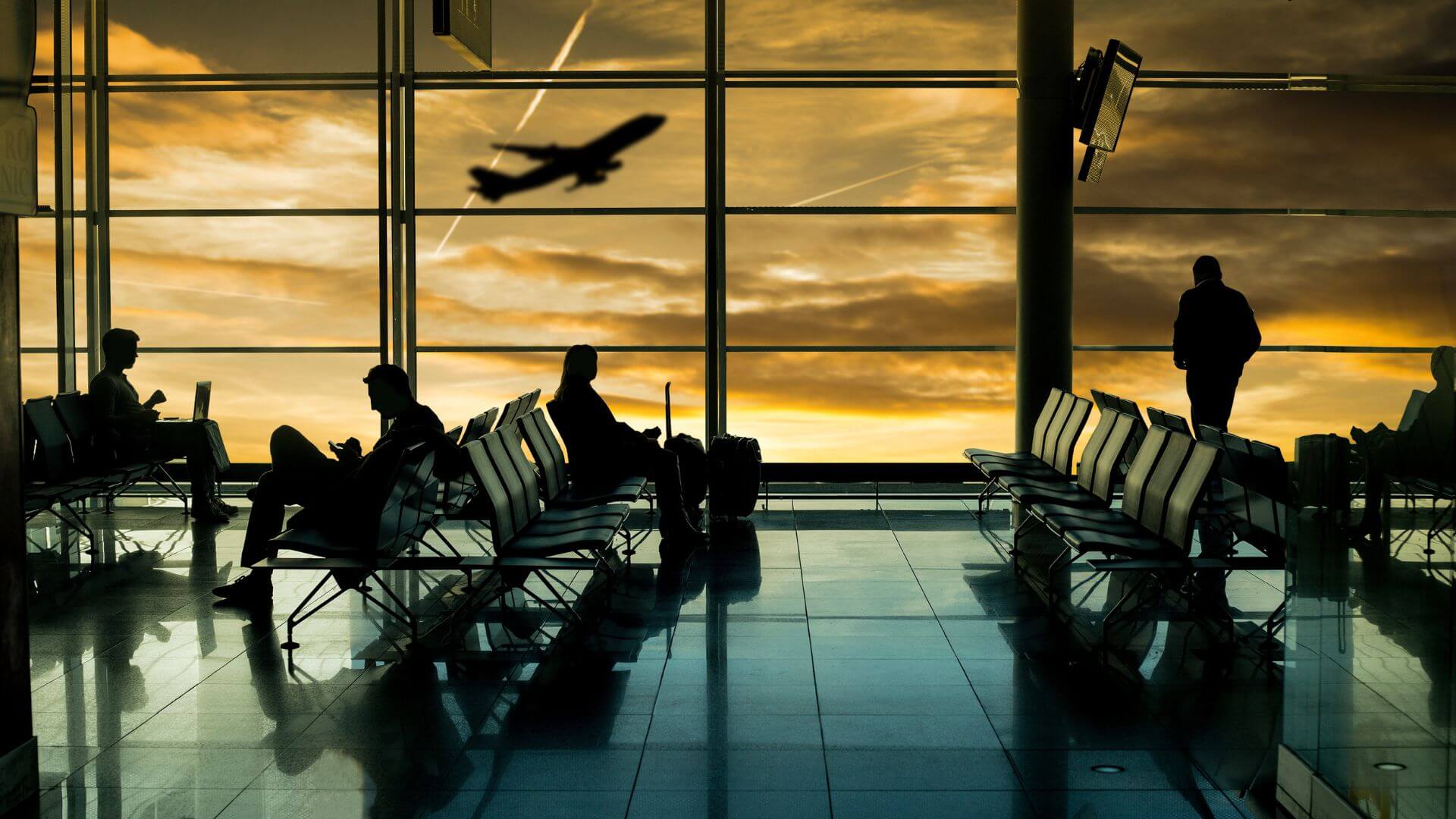
AI in Airports: Managing Surging Passenger Volumes Efficiently

Airports are rapidly evolving into key centers for multi-modal travel across cities and countries. The surge in passenger volumes, increased flight frequency, and expanding connections to new destinations across India and Asia are driving the expansion of airports and their services.

India, already the world’s 3rd largest civil aviation market, plans to double the number of operational airports to 300 by 2047, driven by an eightfold rise in passenger traffic.

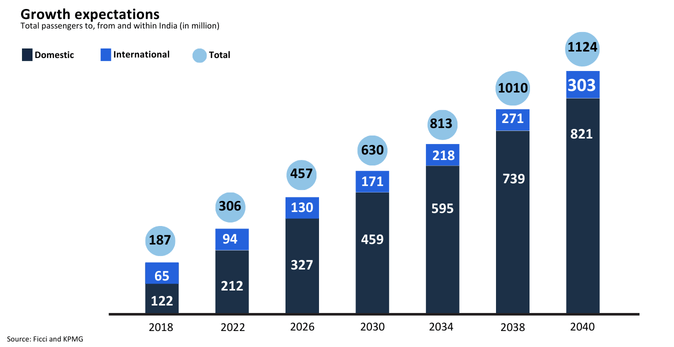
India is set to see investments worth US$ 25 billion by 2027, with Indian carriers projected to double their fleet capacity to around 1,100 aircraft by that year.
The scale and diversity of facilities provided at airports significantly influence the travel experience of passengers worldwide. This presents a unique opportunity for airport operators to attract, engage, build loyalty, and generate a steady stream of revenue from travelers.
Changing demographics and digital-first lifestyle
India’s changing demographics and the rise of a digital-first lifestyle, fueled by affordable communication devices, are reshaping how travelers interact with service providers.
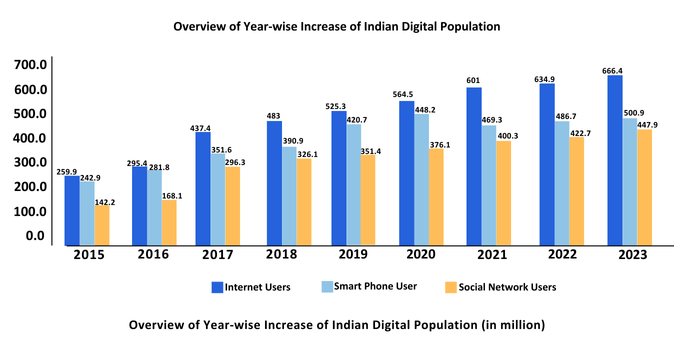
According to recent statistics, India had over 700 million internet users in 2023, and this number is expected to surpass 900 million by 2025. Moreover, smartphone penetration has been a key enabler, with more than 80% of internet traffic in India coming from mobile devices.
This shift is significantly influencing the way travelers engage with service providers. Travel Commerce Insights Report 2022 highlights that 74% of urban travelers in India prefer to make their travel bookings and queries through digital platforms, including websites, apps, and social media, rather than traditional methods like visiting travel agencies. Furthermore, instant messaging apps like WhatsApp are becoming popular for customer service interactions, with India having the largest number of WhatsApp users in the world—over 500 million active users.
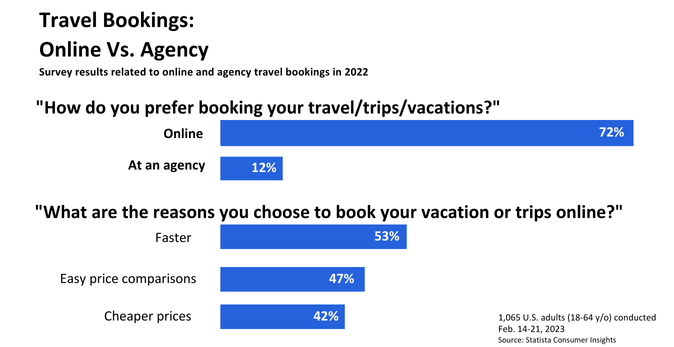
The Indian middle class is expanding, bringing millions of new passengers into the aviation fold. These passengers prioritize affordability but are increasingly looking for a superior travel experience — from the airport to in-flight services. With regional connectivity schemes like UDAN, people from Tier 2 and Tier 3 cities now form a significant portion of this demographic. As these cities become aviation hubs, their unique needs such as improved language support, real-time local information, and streamlined check-in processes must also be addressed.
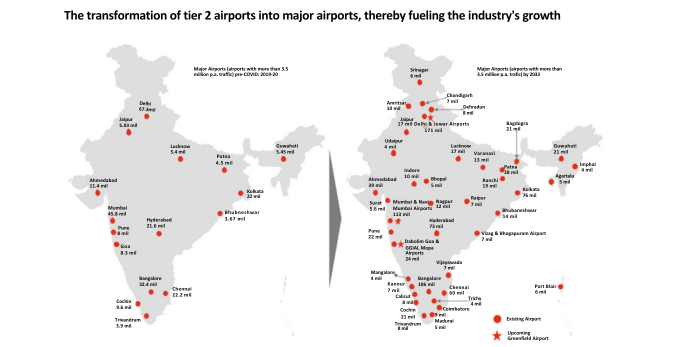
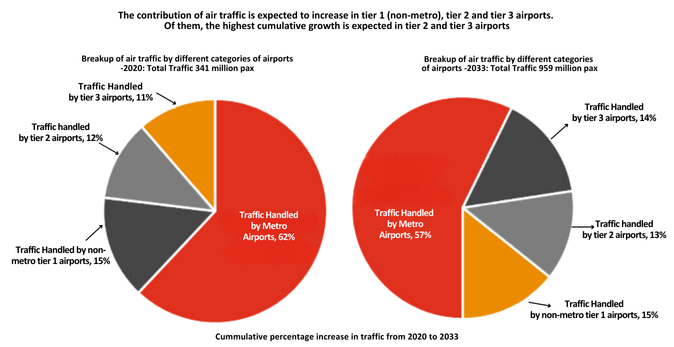
Passenger traffic is projected to increase from 376 million to 3-3.5 billion annually by 2047, with international traffic constituting 10-12% of this growth(Aviation Industry Report). India is expected to witness investments worth US$ 25 billion by 2027, with Indian carriers doubling their fleet capacity to around 1,100 aircraft by that year.
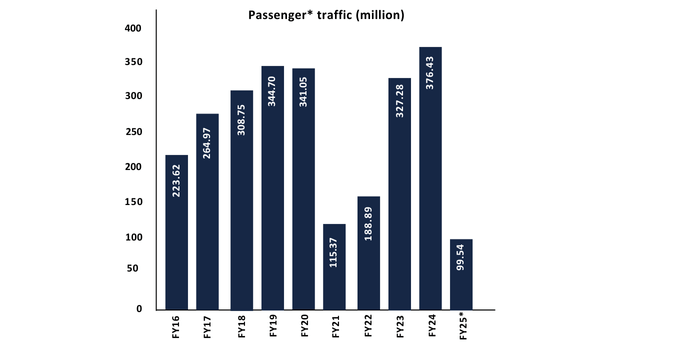
Travelers’ expectations: A personalized, always-on experience
The quality, perception, and reputation of services are heavily influenced by providers' agility and consistency in responding to customer needs. Passengers now reach out via multiple channels including voice calls, chat windows, emails, social media posts, instant messaging, and browsing through websites and mobile apps. They expect responses that are instant, personalized, contextual, and actionable.
According to a report by McKinsey, 75% of customers expect service providers to deliver immediate responses. A study by The Aberdeen Group has shown that even a 1-second delay in response time can lead to 16% lower customer satisfaction and significantly reduce loyalty, potentially causing businesses to lose their existing customers.
Challenges for airport operators and service providers
This explosive growth in passenger numbers comes with its own set of challenges for airports and airlines.
Scalability: Airports are struggling to keep pace with the growing passenger volume. With plans to increase the number of airports to 300 by 2047, there is a pressing need for infrastructure upgrades, capacity expansions, and enhanced services to prevent congestion.
Customer experience: As more passengers take to the skies, delivering a consistently high-quality experience is becoming challenging. Travelers expect prompt communication, easy access to information, and instant problem resolution. Handling multiple channels of communication (calls, emails, social media, chatbots) while ensuring seamless interaction requires cutting-edge solutions.
Personalization: Travelers today expect personalized interactions, from receiving the right promotions to receiving timely alerts about their travel plans. However, the sheer scale of data generated from millions of passengers presents a challenge in curating personalized experiences.
Diverse expectations: With the broadening demographic of travelers, the aviation industry needs to cater to varied preferences, ranging from budget-conscious travelers to those seeking premium services. Providing this wide spectrum of service offerings efficiently can be difficult.
A one-size-fits-all approach is ineffective for today's travelers. Airport operators and service providers must prioritize developing a comprehensive strategy and investing in future-proof technology infrastructure to effectively communicate, interact, and engage with their expanding customer base
With India aiming to operationalize 12 new airports this year under the UDAN scheme, conventional solutions such as call centers, IVR services, and customer service desks will struggle to scale with increasing requests(Aviation Industry Report). Airports must seize the opportunity to attract and retain travelers by offering innovative, high-quality services. These improvements could drive long-term loyalty and consistent revenue streams.
Enter generative AI, a technology that has the potential to completely transform the real-time customer service provided by airports turning the customer experience from one that is reactive to one that is proactive.
Generative AI: The secret weapon for seamless service
Generative AI is rapidly emerging as a key solution to these challenges, shaping the future of air travel. By 2025, Gartner predicts that 40% of customer service organizations will adopt AI-powered tools to enhance capabilities and improve interactions. These AI tools can handle thousands of requests simultaneously, providing instant, contextual, and personalized responses. This reduces wait times, improves customer satisfaction and significantly reduces operational costs. The agility and scalability of Generative AI make it a vital component of future strategies for airport operators looking to enhance customer experiences while maintaining efficiency
The role of Generative AI in addressing these challenges
Generative AI can help service providers ingest, process, and analyze large volumes of text, images, audio, video, and multimedia content to extract relevant intelligence and guide business actions.
Here’s how Generative AI can help:
Customer interaction and support: AI-powered chatbots and virtual assistants can instantly provide travelers with relevant, contextual information — from flight updates to baggage information and visa requirements. These systems can manage inquiries 24/7 across multiple channels, easing the burden on customer service teams and ensuring timely responses.
Data-driven personalization: By analyzing traveler behavior, preferences, and history, Generative AI can offer personalized recommendations, such as travel itineraries, seat preferences, or in-flight services. This not only improves customer satisfaction but also opens up new revenue streams for airlines and airports through targeted marketing.
Operational efficiency: AI can help airports and airlines optimize operations by predicting passenger traffic patterns, managing check-in queues, and reducing delays. By analyzing historical data and real-time inputs, AI can guide airport authorities on resource allocation, improving overall efficiency.
Multilingual support: With India’s linguistic diversity, Generative AI can offer translation services and multi-language support, making travel more accessible to non-English speakers, especially from Tier 2 and Tier 3 cities.
Proactive problem resolution: AI-driven systems can anticipate potential issues, such as flight delays or baggage mishandling, and notify travelers proactively. This builds trust and ensures a smoother experience for passengers.
Digital identity: A passport-free future?
Digital identification is a significant AI-driven innovation currently under development. Imagine a time when travellers won't have to worry about losing their passports, boarding cards, or security checks. Rather, their digital identity—confirmed by AI-driven systems—would let them go from check-in to boarding with ease. Airports utilising AI and biometric data to produce smooth, safe travel experiences may become the standard by 2030.
By investing in advanced technologies such as Generative AI for customer service and facial recognition for security, airports can significantly enhance both the efficiency and personalization of the travel experience, setting the stage for the next generation of smart, connected travel hubs. These airports will be better equipped to handle the growing number of travellers, guarantee smooth transit, and eventually foster enduring consumer loyalty. It takes more than just scaling for growth to stay ahead in a sector that is changing quickly.
The road ahead: A new era of travel
As India continues to invest in its aviation infrastructure, the integration of advanced technologies like Generative AI will be pivotal in addressing the sector's challenges. The increasing passenger traffic will demand scalable solutions, and AI has the potential to automate and enhance multiple aspects of the travel journey — from ticket booking and check-ins to security protocols and customer engagement.
At Navikenz, we assist global businesses in designing and deploying scalable technology platforms enabled with Generative AI capabilities. We support travel service providers, including online travel agencies, immigration services, hospitality providers, and airport operators, with solutions that allow customers to access the right information through their preferred channels.
Our expertise stems from our extensive experience in serving the global travel industry, including airlines, airports, travel technology providers, hotels, car rental agencies, train services, and online travel agencies.
Our Generative AI-enabled solutions for the Travel industry
NKQuire™: A multi-lingual, intelligent conversational chatbot (RAG-enabled) that helps customers query and find the most accurate answers.
NaviCADE™: A solution that processes business contracts and agreements, enabling businesses to track and manage contractual obligations and legal risks.
NVISION™: A scalable, image-based human identity detection and matching solution for enhanced security at airports.
NectarBOT™: A tool that ingests, processes, and analyzes information from files, emails, and social media feeds, using various Large Language Models (LLMs) to generate relevant answers for travelers' queries.
Partnership opportunities
As the Indian aviation sector continues to grow and evolve, embracing AI-driven innovations will be key to enhancing customer experiences, boosting operational efficiencies, and sustaining growth in this dynamic market
We welcome the opportunity to collaborate and discuss your business priorities in delivering memorable experiences for your customers. With our expertise and advanced Generative AI solutions, we can help identify and implement the right technology solutions to meet your business goals.
By focusing on scalable solutions today, you’re preparing for the passengers—and the challenges—of tomorrow. Curious to see how AI can transform your operations? Explore more about our suite of solutions, including NKQuire, NaviCADE, NVISION, and NectarBOT, by clicking here.